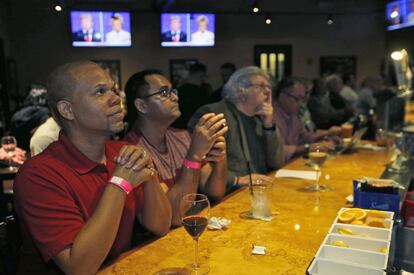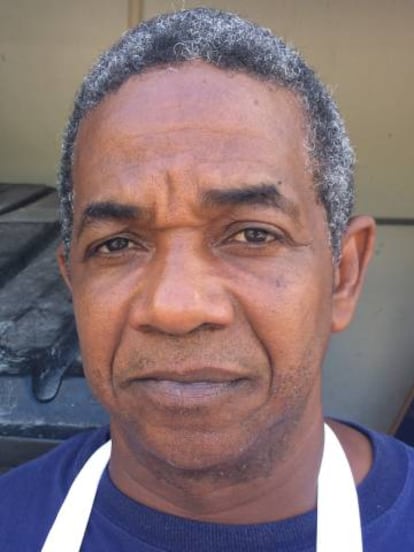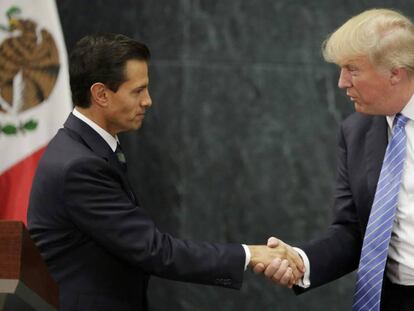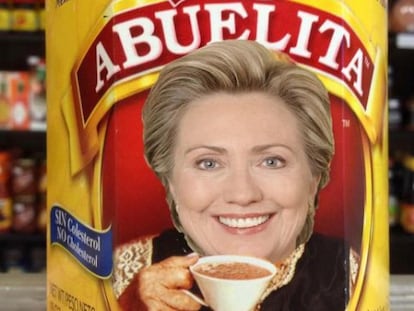The ambivalence of Miami’s Latino community toward Trump and Clinton
Florida is a swing state where Obama won twice, but now Hillary has just a three-point advantage


El Arepazo is a popular restaurant with the large Venezuelan community in Doral, a run-down neighborhood in Miami-Dade County. Wednesday evenings are usually quiet, but last night the place was near empty. Most of its customers seemed to have stayed at home – whether that was to watch the debate between Hillary Clinton and Donald Trump, their last before the presidential elections on November 8, was unclear.
José Luis Guánchez, a Venezuelan karate teacher in his late forties, is sitting alone at a table nursing a drink, watching the debate on the restaurant’s television.
I don’t know, but I don’t really think it makes any difference who wins 18-year-old Isabelle Arias
“If he wins, I think those gringos are going to treat the poor latinos even worse than they already do,” he says. Guánchez, who came to Miami in the 1990s, will be voting for the first time in the United States. “I never voted before because politics doesn’t interest me, but I think that it’s important that this guy doesn’t win. Sometimes he reminds me of Hitler,” he says.
The Latino vote will be key to winning Florida, a decisive state in the race for the White House. With the country’s third-highest number of electoral votes, it’s a notorious swing state: Obama won it in the last two elections, but there is no way of knowing which way it will go this time. According to Real Clear Politics, Clinton is three points ahead of Trump.

Up the road is the Palacio de los Jugos, a café in Hialeah, where the population is 94% Latino, most of them Cuban exiles. “Trump thinks he owns this state because of all the money he’s invested in casinos, but Hillary is going to win here,” says 68-year-old Laura Ángela Viola, a Democratic Party supporter.
“I’m going to vote for him,” counters Cuban-American Juan Santana, who was buying a takeaway food. “He can say anything he likes, but he’s the only guy who can get the economy going.”
Around a quarter of Hialeah’s residents live on the poverty line: the average household income here is $29,000, compared to the national average of $53,600. The city regularly tops the list of the poorest cities in the US.
Earlier in the day, over on Miami Beach, barely 12 miles away across town, but a world apart, two young women are having a late breakfast at the Buenos Aires Bakery. Born in the United States to latino parents, they will both be voting for the first time. Melisa Munilla, aged 19, says she will be voting for Clinton. “I don’t like her much, but I think she’s the most reasonable.” She explains that her Uruguayan father has lived in the United States for 20 years and never bothered to take up citizenship, but that when Trump erupted on the political scene, “he couldn’t become a US citizen soon enough.”

Melisa’s friend, Isabelle Arias – also born here, to a Cuban father and Honduran mother – won’t be voting. She says she doesn’t care who emerges victorious. “I don’t know, but I don’t really think it makes any difference who wins.” When Melisa points out that the president decides whether the country should go to war or not, she replies: “Right, but I’m not going to any war.”
Behind the restaurant, Andrés Tejada, a Dominican who works there as a dishwasher, is taking a break. He says he has never applied for citizenship and won’t be voting. He says that a few years ago he worked on a construction site where a building owned by Trump was going up. “And guess what, everybody except me working there was Mexican.” Tejada, who describes the American dream as “working to pay the rent,” is one of the many undocumented latinos who will not be taking sides in the Trump vs Clinton fight. “But if I were going to vote, then I’d probably do so for the woman.”
English version by Nick Lyne.
Tu suscripción se está usando en otro dispositivo
¿Quieres añadir otro usuario a tu suscripción?
Si continúas leyendo en este dispositivo, no se podrá leer en el otro.
FlechaTu suscripción se está usando en otro dispositivo y solo puedes acceder a EL PAÍS desde un dispositivo a la vez.
Si quieres compartir tu cuenta, cambia tu suscripción a la modalidad Premium, así podrás añadir otro usuario. Cada uno accederá con su propia cuenta de email, lo que os permitirá personalizar vuestra experiencia en EL PAÍS.
En el caso de no saber quién está usando tu cuenta, te recomendamos cambiar tu contraseña aquí.
Si decides continuar compartiendo tu cuenta, este mensaje se mostrará en tu dispositivo y en el de la otra persona que está usando tu cuenta de forma indefinida, afectando a tu experiencia de lectura. Puedes consultar aquí los términos y condiciones de la suscripción digital.










































